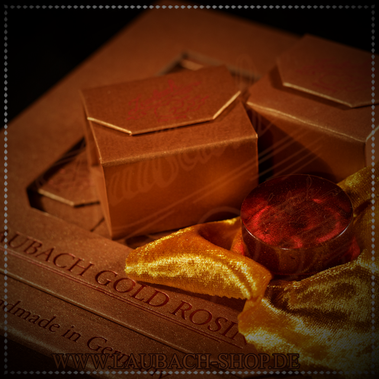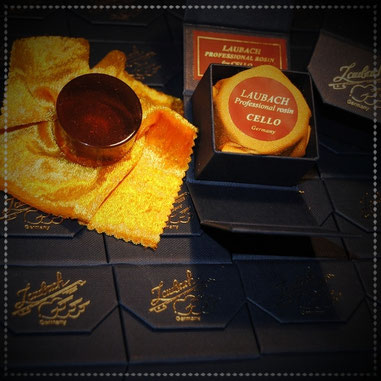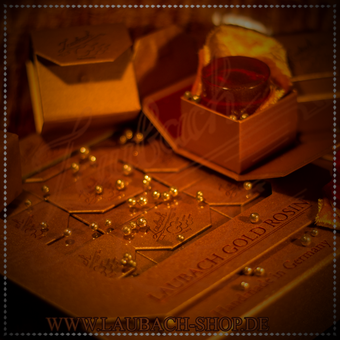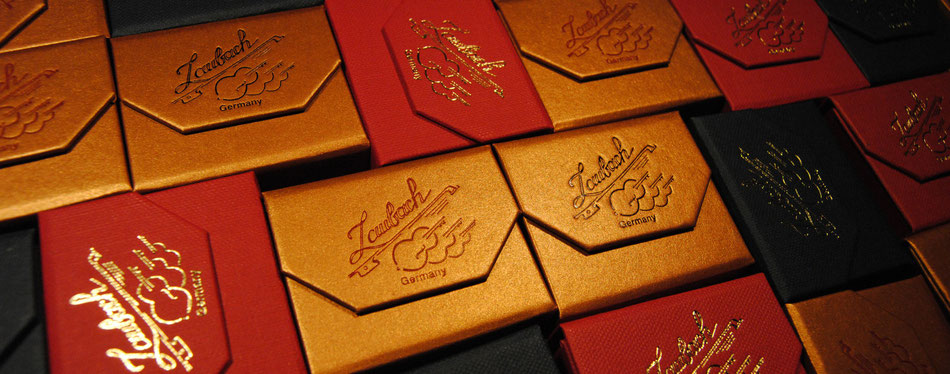Laubach rosin and GOLD rosin for violin viola cello
Laubach best Rosin - directly from the family workshop.
Our Gold Rosin premium class is made in small quantities in the family workshop in Bavaria, Germany. For the production of exclusive rosin which is being cast entirely by hand, we only use the highest quality natural ingredients.
It is very important for us, that our rosin meets the high demands of professional musicians.
Which rosin is the best for the violin, viola and cello - all that glitters is not gold!

What is rosin, what is it made of and what is best for your stringed instrument?
Rosin is a necessary accessory for any stringed instrument, which makes it impossible to play without it. When buying gold rosin, these listed factors are essential. Only few string players know how rosin is made, how it works, or what types of colophony are best for violin, viola, cello and double bass. When standing in front of a counter of accessories for stringed instruments in a music store, musicians do not know what to choose, light or dark rosin, winter or summer, soft or hard rosin with added metals such as gold, silver or copper. Rosin, not only known by all violin makers, but also string musicians, is a resin that is harvested from different varieties of pines and larches throughout Europe, Asia, North America and New Zealand. The name rosinum brings us back to the ancient city of Kolofon in Lydia, when in ancient times, people were able to prepare pine resins originally used for medical and magical procedures. The future rosin, namely pine grease, is extracted directly from trees growing in the woods in a similar way, as birch or maple sap is extracted - this process does not harm the tree. After the resin is collected it can be mixed with the resin of other trees. Usually larch, spruce and fir to create a special formula. The producers of rosin keep their rosin recipes hidden, the same way violin masters hide the recipes of their own master violin varnish, as it has been done since the time of the famous violin makers Amati and Stradivari. This mixture is then heated until the rosin resins completely melt. It is cleaned, and after cooking, the "broth" is poured into molds. After approximately 30 minutes the rosin cools down and hardens, its surface smoothes and becomes shiny. Rosin is packed in fabric bags, wooden boxes, or hermetic mini containers.
The right choice and use of rosin

When choosing your first rosin, decide what class of colophony you are looking for: student or professional level. The colophony of the student class is cheaper, but often has a sandy sound and when playing a lot, the rosin dust falls on the instrument. As a rule, performers of classical music prefer to buy more expensive types of professional rosin, as they are much better suited for their needs. Professional grade rosin is created from a cleaner, higher quality natural resin with special recipes and produces an even and controlled tone for violin, viola or cello when playing.
What is the difference between dark and light rosin

First of all decide what rosin color and mixture you need: light or dark. There is a popular believe that dark rosin is softer and, as a rule, too sticky in hot and humid weather - it is better suited for cool and dry climatic conditions. Since light rosin is harder and not as sticky as dark ones it is more preferable for violinists and violists. Dark - soft rosins, as a rule, are preferred by cellists. The contrabass rosin has an even more viscous consistency and is not suitable for other string instruments. It should be known that the color of rosin and its consistency heavily depend on the manufacturer's recipe. Therefore, in our time with modern technologies, old concepts can not be accepted as indisputable truths. At the same time, in case of extreme conditions, violinists, viola players and cellists can play, both with light and dark rosin.
Buying gold rosin without making a mistake and being disappointed

Rosin producers sometimes also add precious metals to their formulations. You can rarely see gold, silver, copper or even "meteorites" in the rosin composition, and sometimes these listed metals are only present in the cast of the rosin label and bear in themselves only the names of the brands of strings to which, according to the manufacturer, these rosins more suitable: Pirastro Gold rosin, Evah Pirazzi Gold rosin. If you look closely at rosin varieties, you will not be able to detect metals or their impurities in it, it is absolutely transparent, although it has the word Gold in its name. As part of the Goldflex Pirastro violin rosin, you will still be able to notice the "golden blend", which contains the same amount of real gold as a Christmas tree toy. Some manufacturers of rosin skillfully use these words and phrases in the description of their rosin: gold particles (Goldflex Pirastro), light gold or dark gold with untranslatable subtext (GEWA Old Master Light Gold Designer or Light Gold Mini, Dark Gold) and so on. Other rosins, supposedly made by following "old recipes", as well as new rosins of Asian origin with various impurities and additives in their mixture, are not worth discussing. Many musicians, who have bought the desired rosin and while reading the cherished word "GOLD" in the name of it unfortunately are mistaken, without finding and not perceiving the expected characteristics inherent in rosin with gold. Do not mix up the definition of golden rosin and rosin with the content of real gold - not all that glitters is gold! - Some musicians, having bought out of ignorance such a "gilded" rosin and issued their verdict that gold rosin does not represent anything special, just faced with the wrong description of the colophony of the manufacturer or deliberately incorrect description of the seller, obsessive and persistently added to the description of the proposed rosin the magic word gold. A detailed introduction to the misleading musicians, as a rule, is done to increase the range and attract a trusting buyer. Do not confuse the definition of Golden Rosin and rosin with the content of the present 999° gold. When you buy jewelry made from gold or silver, you always pay attention and control the percentage of the precious metal, which is clearly indicated by the manufacturer on the etiquette. You do not onl trust the advertising description on the box, the package, or the inscription on the display…
Did you ever wonder why many manufacturers and advertisers offering rosin write the catchy word GOLD in large letters in the description? It’s pretty simple. In the last two decades, golden rosin for the violin, viola and cello has been very loved and popular among the best world soloists, as well as professional orchestras. Anyone who has at least once tried real quality rosin with the presence of 999° gold in its blend, will never again swap it for a cheap substitute. That is why some rosin producers use tricks and manipulate with the word „Gold“ in the name to advertise their product and, if possible, at least somehow prolong the life of a mediocre, outdated rosin that does not meet modern performance requirements.
By spending and buying a similar product, you burden yourself to use a little useful rosin that does not allow you to play at your fullest potential. After all, you know how important it is to prove yourself during the exam, when listening to the orchestra or school. Having bought and used not the best rosin, you postpone and complicate your success for at least a year or two, until you again face the dilemma of choosing and buying a new, good and high quality premium colophony.
Gold rosin for violin, viola or cello - with high-grade gold content emits a warm, bright sound and is suitable for all string instruments. Adding gold to rosin softens the sometimes rough-sounding instrument, since high-grade gold is free of foreign impurities and carries a very elastically and gentle characteristic. Famous soloists who chose golden rosin as a priority note often help them to achieve a more precise and focused sound on their rare old-Italian stringed instruments.
Not only orchestras, which tour extensively and often in different countries with different climatic zones and changes in temperature or humidity, choose gold rosin for their instrument, but also students who are preparing for important exams. It is known that as an ideal component present in rosin, only real high-grade gold can be used that does not enter into a chemical reaction, primarily with rosin itself. Thus, this rosin improves and maintains at an excellent level of game qualities, respectively, without accelerating the oxidation of colophony.
Rosin that contains silver, copper and other metals – which one is better.
Due to strong oxidation, especially with various metallic additives (silver, copper, zinc, lead, tin and metallic star dust), rosin loses its qualities required by bow play. Accordingly, the aging of the rosin is, in fact, an oxidation process, which is one of the signs of strong rosin dusting. Silver rosin containing silver gives a concentrated, bright tone and especially these qualities are manifested in the upper characteristic. Sometimes copper is added to the formulation of rosin. It is believed that it can facilitate the game for beginners (especially for children who play on small violins 1/4, 1/2 or 3/4). Copper creates a warm, almost velvety, soft sound. This rosin is also popular among performers of ancient music. Rosin with the content of silver or copper shows its qualities well within the first few months after manufacturing. But, as is known from the school course of chemistry, silver and copper and other highly corrosive metals in acids very quickly begin to oxidize the rosin blend and adversely affect the quality of rosin and adhesion when playing the stringed instrument. Rosin begins to strongly dust, lose freshness and its original qualities. When buying rosin in a music store, none of the string players can be sure of the age of the rosin and, accordingly, its freshness. Nobody can guarantee that this rosin is cast just a few months ago. And buying rosin, which has already begun to dust, for only a few months of useful use, is quite expensive.
Dust that appears during the application of rosin irritates performers and can even cause allergies. Watch your health and try to regularly replace the old rosin.
Anti-allergenic rosin - the pros and cons

To combat rosin allergy, some companies also offer hypoallergenic rosin. This pure, non-dusty rosin can pleasantly please people suffering from allergies. Unfortunately, its sound and mechanical qualities for the performers leave much to be desired. Regardless of which rosin you choose - use it sparingly. Many musicians use too much rosin, thereby applying to much rosin to the bow hair, significantly contaminating the upper deck of the violin, viola and even cello. Indeed, it is not always necessary to apply rosin to the bow before the game. In fact you should feel when the bow needs the appliance of rosin. If the bow is excessively rosinized - in the nearest future it may be necessary to replace the bow hair. To prevent dust spots of rosin on your instrument - after each lesson, thoroughly clean the surface of your favorite instrument, strings and bow from rosin dust. From time to time, you can use special cleaning and polishing tools for stringed instruments. If you do not clean the instrument, a rosin layer can form on the surface, which in future is difficult to clean. Laubach cleaners always offer a cleaning service for your stringed instrument, that isn’t comparable to any other cleaning product. It is much easier and cheaper to wipe the varnish surface of a stringed instrument after each game with the Laubach cleaning solution.
Where to buy better and inexpensive gold rosin.

A 100% guarantee for the purchase of fresh, quality rosin, which will last you a long time, is buying directly from the manufacturer! In the age of the Internet - everything is possible and no matter where you are - in New York, Shanghai, Tokyo, Los Angeles, Toronto, Sidney, Boston, London, Seoul, Hong Kong, Singapore, Taiwan - you now have the opportunity, without leaving your apartment, to purchase 100% of the original gold rosin from the official online store of the manufacturer and, at the same time, save a considerable amount of money.
KONTAKT:
TELEFON: +49 951 18079108
ADRESSE: Hauptstraße 35, 96163 Gundelsheim / Bamberg GERMANY


If your order destination is within the European Union please select the options of our products which are located in the shop sections labeled "Deutsch" / "English EU". Since these prices already inlcude VAT. Our "English Worldwide" and "Русский" sections use the method of duty free, which can ONLY be used by shipping addresses outside of the EU.
2 Due to different VAT rates in different countries, we do not display VAT in our online shop. The specific VAT for your country will be indicated on the final invoice.
© Laubach Strings Shop 2025





